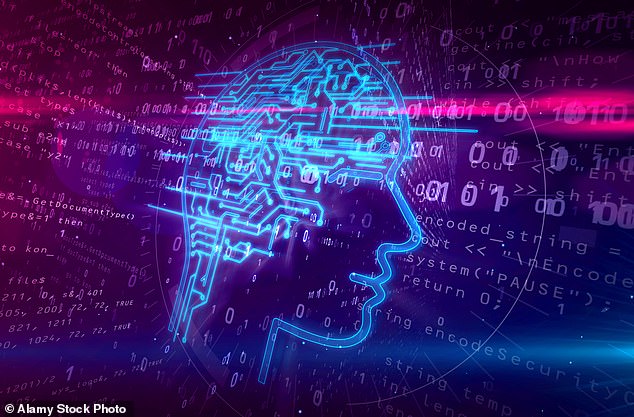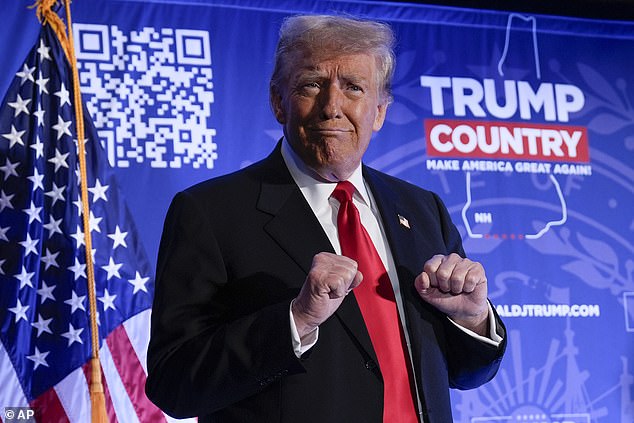From deepfake videos and mass job losses, the shadow of artificial intelligence has hung over Davos.
The Swiss mountain resort hosting global elites at the World Economic Forum has this week been dominated by the opportunities and dangers posed by AI.
Many hope it will bring a golden age of life-saving scientific developments – and higher profits.
But as elections loom across the world, the fear that its potential to cause chaos has come to the fore.
And the biggest election – in which Donald Trump seems to have a growing chance of returning to the White House – is an especially terrifying prospect for the self-proclaimed great and the good who breathed a sigh of relief when he was defeated by Joe Biden four years ago.

Davos, which plays host to global elites at the World Economic Forum, has this week been dominated by the opportunities and dangers posed by AI
The advance of AI – or rather ‘generative AI’ – has been so rapid that a new age of misinformation is already here, in time to disrupt polls in democracies from the UK to India as well as the US.
The technology has taken the world by storm in little over a year since the release of ChatGPT.
Generative AI feeds on mountains of data to produce human-like content, from poems to computer code.
The fear is that so-called ‘deepfake’ videos – so realistic that it is virtually impossible to tell they are not genuine – could upend elections, resulting in protests and even violence.
And the prospect is one that is already becoming real. ‘We have noticed in the past few weeks quite a preponderance of AI news sites emerging that just do fake news,’ said Will Lewis, a former Daily Telegraph editor and now publisher of the Washington Post in the US.
‘It is not coming, it’s here. There’s a real chance you’ll run into fake news that’s going to pollute your minds today, without knowing about it.’
Advocates of AI are already proclaiming its benefits.
Albert Bourla, chief executive of drug maker Pfizer, said it helped to develop paxlovid, a Covid pill, in four months rather than four years. ‘Millions of lives were saved because of that,’ he said.
And Marc Benioff, boss of the commercial software giant Salesforce, cites the Gucci customer service centre in Milan where his firm’s AI-based programme has helped boost sales by 30 per cent’.
But he also worries it could result in a ‘Hiroshima moment’ – and says it must be properly regulated. ‘We’re having this incredible experience on AI and we really haven’t had this kind of interactivity before,’ he said.
‘But we don’t trust it quite yet. We have to also turn to those regulators and say “Hey, if you look at social media the past decade it’s been kind of a f***ing s***show, it’s pretty bad.”
‘We don’t want that in our AI industry, we want to have a good healthy partnership with these regulators.’

AI boost? Donald Trump is running for President once again sparking fears of a dirty, social media fuelled election race
Even Sam Altman, the boss of ChatGPT maker Open AI and another star turn here, does not know whether AI will turn out for good or ill.
‘This is a technology that’s clearly very powerful and that we cannot say with certainty exactly what’s going to happen. But it’s easy to imagine with this one that it’s going to have massive effects on the world and that it could go very wrong.
‘The direction we’re trying to push it in is one that we think we can make safe.’
Lurking below the surface is the fear of how a US election could be affected.
Vocal criticism of Trump, the man who could soon once again be the world’s most powerful, has been rare in Davos but the fear of what his election might mean has been a strong undercurrent.
Privately, some US executives have been appalled that the man whose supporters launched an insurrection when he lost the last election could be president again.
Others, such as Kristalina Georgieva, head of the International Monetary Fund, voice fears about what that could mean for the world.
‘When you look at the likely policies, in terms of being more conscious about the integrated global economy and how it benefits people everywhere, there may be some serious concerns,’ she said.
Trump is unlikely to be worried though, especially as one of the world’s most powerful chief executives, JP Morgan boss Jamie Dimon, seems less concerned than many.
‘Take a step back, be honest. He was kind of right about Nato, kind of right on immigration,’ Dimon told CNBC. ‘He grew the economy quite well.
‘Trade tax reform worked. He was right about some of China. He wasn’t wrong about some critical issues, and that’s why they voted for him.’
Some links in this article may be affiliate links. If you click on them we may earn a small commission. That helps us fund This Is Money, and keep it free to use. We do not write articles to promote products. We do not allow any commercial relationship to affect our editorial independence.



